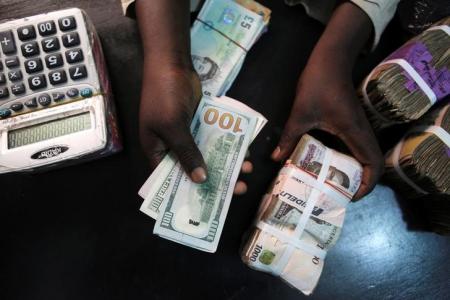
By Chijioke Ohuocha and Oludare Mayowa
LAGOS (Reuters) – Nigeria is considering amendments to its foreign exchange laws to curb illegal fund transfers and insider dealing and stop individuals holding hard currency outside the banking system, a draft bill seen by Reuters on Monday showed.
Africa’s largest economy is facing chronic dollar shortages caused by a slump in sales of and prices for crude oil, its mainstay, which has slashed government revenues, weakened the naira currency, stoked inflation and pushed it into a recession.
The draft bill prepared by the Nigerian Law Reform Commission (NLRC), which advises the government, said the new proposals were aimed at promoting the orderly development and maintenance of the currency market in Nigeria.
It provisions include making it an offence to hold hard currency in cash outside the banking system.
“The possession of foreign currency by any person without depositing same in a domiciliary account within 30 days of its acquisition constitutes an offence liable on conviction to two years imprisonment or to a fine of 20 percent of the amount of the foreign currency involved,” the draft bill said.
The NLRC said the existing currency law made it difficult to regulate foreign exchange transactions in Nigeria, which the reform seeks to address.
The law currently “prohibits the seizure, forfeiture or expropriation of imported money by the government without providing for exceptions” and is “narrow in scope”, it said.
On Monday, the statistics office said Nigeria’s recession had deepened in the third quarter, with the economy contracting 2.24 percent as oil production fell and dollar shortages hurt.[nL8N1DM1JG]
The shortages have caused many firms to halt operations and lay off workers, compounding the economic crisis.
The central bank introduced capital controls last year to conserve its dwindling foreign reserves as oil prices collapsed. It subsequently restricted access to the import of certain items and introduced a 16-month dollar peg to stem the naira slide.
It ditched the peg in June, adopting a flexible currency policy, leading to a 30 percent devaluation on the day.
The naira has continued to slide, trading around 30 percent weaker on the black market compared with Monday’s quote of 315 per dollar on the official market.
The NLRC said the amendments were necessary to “strengthen the framework for effective monitoring and control, and to ensure probity in foreign exchange transactions in Nigeria”.
(Writing by Chijioke Ohuocha; Editing by Catherine Evans)